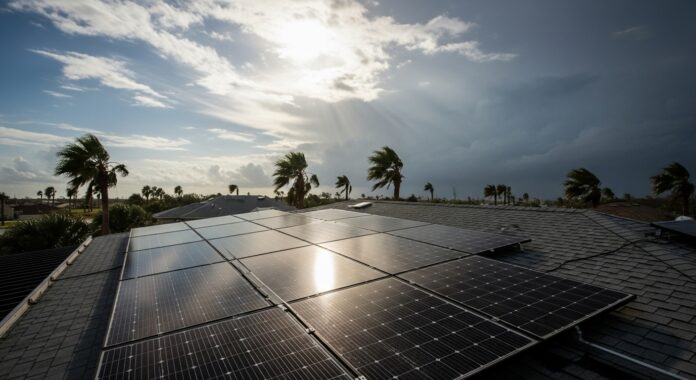Floridians are increasingly turning to solar power to lower utility bills and gain more energy independence. In fact, Florida consistently ranks among the top three states in the U.S. for solar installations, thanks to abundant sunshine and a growing commitment to renewable energy.
But before you sign a contract with a solar installer, there’s an important question to answer: will your homeowners insurance cover your solar panels?
The answer is not straightforward. While many policies do cover rooftop solar systems, Florida’s unique climate, storm risks, and insurance market challenges create additional layers of complexity.
This article provides a comprehensive breakdown of how solar power interacts with homeowners insurance in Florida, what exclusions to watch for, how premiums may change, and what you can do to ensure your system is fully protected.
How Homeowners Insurance Typically Treats Solar Panels
In most cases, rooftop solar panels are considered part of the dwelling once permanently attached to the roof. That means they fall under Coverage A – Dwelling Protection, the same category that covers the roof, walls, and other structures attached to the home.
If your system is ground-mounted or installed on a detached structure (such as a shed or pergola), it may instead fall under Coverage B – Other Structures, which usually has lower limits (about 10% of dwelling coverage).
However, the specifics vary from company to company. Some carriers treat rooftop panels as part of the home, others exclude them, and a few require a separate solar endorsement. Failing to declare your solar installation can result in denied claims or even policy cancellation if damage occurs.
Common Risks Covered (and Not Covered)
In Florida, the most common risks to solar equipment are wind, hail, lightning, fire, and falling objects. Most standard policies cover these perils. However, exclusions may apply, especially in coastal or hurricane-prone areas. Here are a few common scenarios:
- Hurricane Damage: Panels blown off or damaged by debris may be covered, but you’ll likely face a hurricane deductible (often higher than the standard deductible).
- Roof Leaks: If leaks occur due to faulty installation, your insurer may deny coverage, classifying it as a workmanship issue. That risk falls back on the installer’s warranty.
- Wear and Tear: Natural degradation, panel efficiency loss, or micro-cracks over time are not covered by homeowners insurance. Manufacturer warranties usually address these issues.
- Battery Storage: Systems with batteries may need additional coverage. Insurers sometimes classify batteries as personal property rather than dwelling equipment, leading to different coverage rules.
- Flood Damage: Flood insurance (through NFIP or a private carrier) is required for water damage. Standard homeowners policies do not cover flooding, even if solar equipment is destroyed.
Why Florida Homeowners Face Unique Solar Insurance Challenges
Florida’s climate and insurance environment create unique challenges for solar coverage:
- High Hurricane Exposure: Florida experiences frequent severe storms. Solar panels, though engineered for durability, remain vulnerable to flying debris and high winds.
- Roof Integrity Concerns: Installing panels requires roof penetrations. If your roof isn’t relatively new, insurers may demand replacement before approving solar coverage.
- Insurance Market Volatility: Florida’s insurance market has seen multiple carrier exits. Some insurers now refuse to underwrite homes with solar, citing elevated replacement costs and liability concerns.
- Building Code Requirements: Florida has strict wind-mitigation codes. If your solar installation doesn’t meet them, your insurer could deny claims or refuse coverage.
How Solar Can Impact Your Premiums
Adding solar panels almost always affects your premium, though not always negatively. Some homeowners experience moderate increases of 10–20% because the replacement cost of the home rises.
In other cases, insurers may add surcharges if they believe the system introduces risk.
Factors influencing your premium include:
- System Size and Value: A $35,000 system adds significantly to your insured property value.
- Mounting Method: Flush-mounted panels with hurricane-rated racking may be viewed more favorably than older rack systems.
- Location: Homes near the coast may face higher rates due to increased storm exposure.
- Insurer Attitude Toward Solar: Some companies actively market themselves as solar-friendly, while others exclude or surcharge solar systems.
Steps to Ensure Your Solar System is Properly Covered
Before installation, follow these steps to protect your investment:
- Contact Your Insurer: Notify your insurance company before signing the installation contract. Ask if they cover solar under your current policy or require an endorsement.
- Get Written Confirmation: Obtain policy language or an updated declarations page that specifies coverage for solar panels.
- Hire a Licensed Installer: Using a contractor licensed in Florida and compliant with the Florida Building Code reduces risks of coverage disputes.
- Adjust Coverage Limits: Ensure your dwelling coverage is high enough to include the replacement value of the solar system.
- Ask About Liability Coverage: Some net metering agreements place liability on homeowners. Confirm your liability limits are sufficient.
Florida Case Examples
Consider two scenarios that real Florida homeowners have experienced:
Case 1: A Tampa homeowner added a $30,000 rooftop system in 2023. Their insurer increased annual premiums by 15% to reflect higher replacement costs. However, when Hurricane Idalia caused panel damage, the insurer paid the $18,000 claim after the hurricane deductible.
Case 2: A Sarasota homeowner installed solar panels without notifying their insurer. When hail cracked multiple modules, the claim was denied, and the homeowner had to rely on manufacturer warranties and personal funds for repairs. The insurer later non-renewed the policy due to “material misrepresentation.”
What If Your Insurer Refuses Coverage?
If your current company declines coverage for solar, here are your options:
- Shop for solar-friendly insurers—carriers that explicitly cover renewable energy systems.
- Work with a broker who specializes in hard-to-place risks in Florida.
- Explore Citizens Property Insurance, the state’s insurer of last resort. While Citizens does not exclude solar outright, coverage may be restrictive.
- Consider a stand-alone solar equipment policy offered by some specialty insurers.
Insurance for Solar Batteries and Energy Storage
As more homeowners pair solar with battery storage, insurance questions increase. Batteries may fall under different coverage categories depending on installation. If wall-mounted in a garage, insurers may classify them as personal property, not dwelling coverage. Equipment breakdown endorsements may be needed to protect against inverter or battery failure. Always ask your insurer how batteries are classified under your policy.
Claim Scenarios: How Coverage Plays Out
Understanding how a claim works can help set expectations:
- Windstorm Claim: A storm rips panels from your roof. The insurer covers replacement minus your hurricane deductible. If your deductible is $10,000 and the damage totals $25,000, you pay the first $10,000.
- Fire Claim: A house fire damages your inverter and wiring. Covered as part of the dwelling; replacement cost is reimbursed.
- Improper Installation: A poorly installed system causes leaks. Insurer denies coverage, pointing to installer’s workmanship warranty.
Best Practices for Solar-Friendly Coverage
- Always disclose solar projects before installation.
- Choose hurricane-rated equipment certified for Florida’s wind zones.
- Ask your insurer about special deductibles (hurricane vs. all-other-perils).
- Maintain thorough documentation for all installation and maintenance work.
- Review your coverage annually as property values and risks evolve.
Frequently Asked Questions
1. Does homeowners insurance cover rooftop solar panels in Florida?
Yes, in most cases solar panels attached to the roof are covered under dwelling coverage. Always confirm with your insurer before installation.
2. Are ground-mounted solar panels covered?
They may be covered, but usually under “Other Structures” coverage, which often has lower limits.
3. Will adding solar panels raise my insurance premiums?
Yes, your premiums may increase to reflect the higher replacement cost. Expect a 10–20% increase in many cases.
4. Are solar batteries covered?
Sometimes, but they may fall under personal property instead of dwelling coverage. Ask your insurer specifically.
5. Are solar panels covered for hurricane damage?
Yes, but only after your hurricane deductible is applied, which may be higher than your standard deductible.
6. Does flood insurance cover solar panels?
Flood damage is not covered under standard homeowners insurance. You’ll need a separate flood policy.
7. What if my insurer won’t cover solar panels?
You may need to shop for a solar-friendly carrier, use a broker, or consider Citizens Insurance as a last resort.
8. Will improper installation be covered?
No. Faulty workmanship is excluded. That risk is covered by your installer’s warranty, not your homeowners insurance.
9. Do I need to tell my insurer before installing solar?
Yes. Failing to notify your insurer can result in denied claims or policy non-renewal.
10. Are maintenance issues covered?
No. Routine maintenance, wear and tear, and efficiency loss are excluded from homeowners coverage.
Insurance Agents at GreatFlorida Insurance can help you navigate through questions on solar power.



